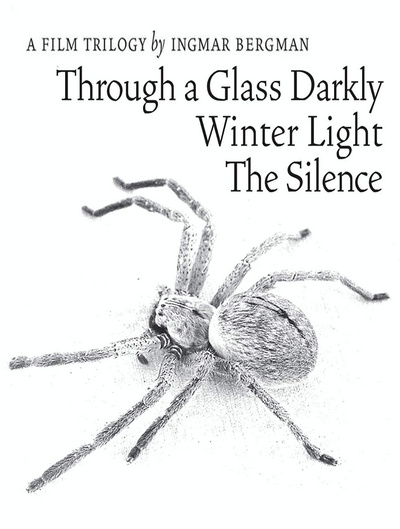Being the host, I will not be participating in the contest—but I just couldn't let the opportunity pass to write something on the topic and possibly introduce a few foreign films to whoever concerned.
Also I want to thank everyone who has entered the contest. You are the life of it. You honor me.
Faith Trilogy
Dir — Imgmar BergmanBergman’s Faith Trilogy
I had the opportunity to see Bergman's unofficial trilogy films, Through a Glass Darkly, Winter Light, and The Silence many moons ago. I didn't comprehend their true nature and implications immediately. Realization dawned on me slowly, over the years, and as I was growing more accustomed to Bergman's films, life, and his personal views.
It’s a possibility that you don’t know who Ingmar Bergman is. Or you could be someone who’s heard of him due to his popular title The Seventh Seal, or you could be someone who’s a devout Ingmar Bergman fan and now wearing a smirk on their face seeing my plebeian assessment that someone might not have heard of the great filmmaker—whoever you are, I’d like to take some of your time and talk about why I fervently admire the faith trilogy by Mr. Bergman and why I think these films should be cherished with more enthusiasm even after all these years of their release.
Now, the faith trilogy isn’t really a trilogy per se in the traditional sense. The films do not take place in the same fictional world, location, nor do they follow one another narratively, the actors are different, the stories are quite distinct from each other. The only string that binds all three is a common theme-Faith. Even that is not pronounced all the time. You can literally take each film for itself and form your ideas around them. That's quite alright.
Faith. What exactly is faith?
Is it only your commitment and reliance on a higher power? Is it good wishes that someone else might do the right thing even though they might not gain anything from it? is it the assurance that my partner in life won’t be cheating on me? Is it the expectations an institution puts on its followers that they won’t be violating the set of regulations it imposes upon them? We use the word to describe an array of scenarios.
While Bergman uses social scenarios to imply the theme of faith, for instance, faith to one's moral virtue in The Silence, it is ultimately about faith in God. Berman was the son of a pastor, and his father was a strict practitioner. Through a considerable portion of his life, Bergman battled inwardly with his idea of faith and the nature of God—which he expressed through his art.
In Through a glass darkly (1961), the god appears to the schizophrenic protagonist as a monstrous spider-god, who wants to penetrate her. A god of suffering. Bergman denies the certainty of a just god, yet a question erupts. Existence of love as the proof of God. Love is, therefore God.
And in the second film, Winter Light (1963), a pastor's regular parishioner commits suicide—who was terrified of nuclear war. War is the opposite of love, and way more apparent than love. The concept of love as god is held hostage in the film, while uncertainty creeps in. Being unable to save his parishioner, the pastor questions his conviction.
The Silence (1963), the third film, is God's silence, as Bergman called it. Two characters serve as the opposing forces of human characteristics, as their constant will to battle each other bounces off the wall that is God's silence. One virtuous, one exploiting.
Each of these films deserves in-depth discussions and their own discussion threads. And anyone who has been dazzled with the barrage of introspective questions regarding their own faith might find them fascinating. I was there myself at one point in my life and looking back, they'd surely assist in my tumultuous moments for sure.
All of these three films are made in Sweden and in the Swedish language, hence foreign cinema. However, I've never felt any sort of distance from them. To me, the language barrier doesn't matter much. The frames speak loudly enough even without sound.

You can read more of my film and literature related articles on my hive blog page.



When you say foreign to what language you mean since you write in English
Foreign is subjective, isn't it? For native English speakers, films made in other languages can be considered foreign. You know, when you have to use subtitles.
I'm not a native English-speaking person, but it is my second language and I think I'm not handicapped if I'm to express in it.
So for me, films made in any language other than English or Bangla (my native tongue), are foreign to me.
In this instance, all three films are in Swedish.
ok
@notacinephile! This post has been manually curated by the $PIZZA Token team!
Learn more about $PIZZA Token at hive.pizza. Enjoy a slice of $PIZZA on us!
Hi, Not a cinephile..
I am also from bd.. Your posts and blogs are one of my likings. I greatly appreciate your writings and way of presenting a concept.
Take my cordial regards...
Thank you 🙂👍
Bergman... So controversial, and yet, so magnificent in most of his movies.
This is a filmmaker that everyone who really likes cinema should know and appreciate.
Sorry, I'm late. :)
Bergman is quite a godlike figure among the film communities, as you well know. Never cared what the media has spurred up over the years.
Your content has been voted as a part of Encouragement program. Keep up the good work!
Use Ecency daily to boost your growth on platform!
Support Ecency
Vote for Proposal
Delegate HP and earn more